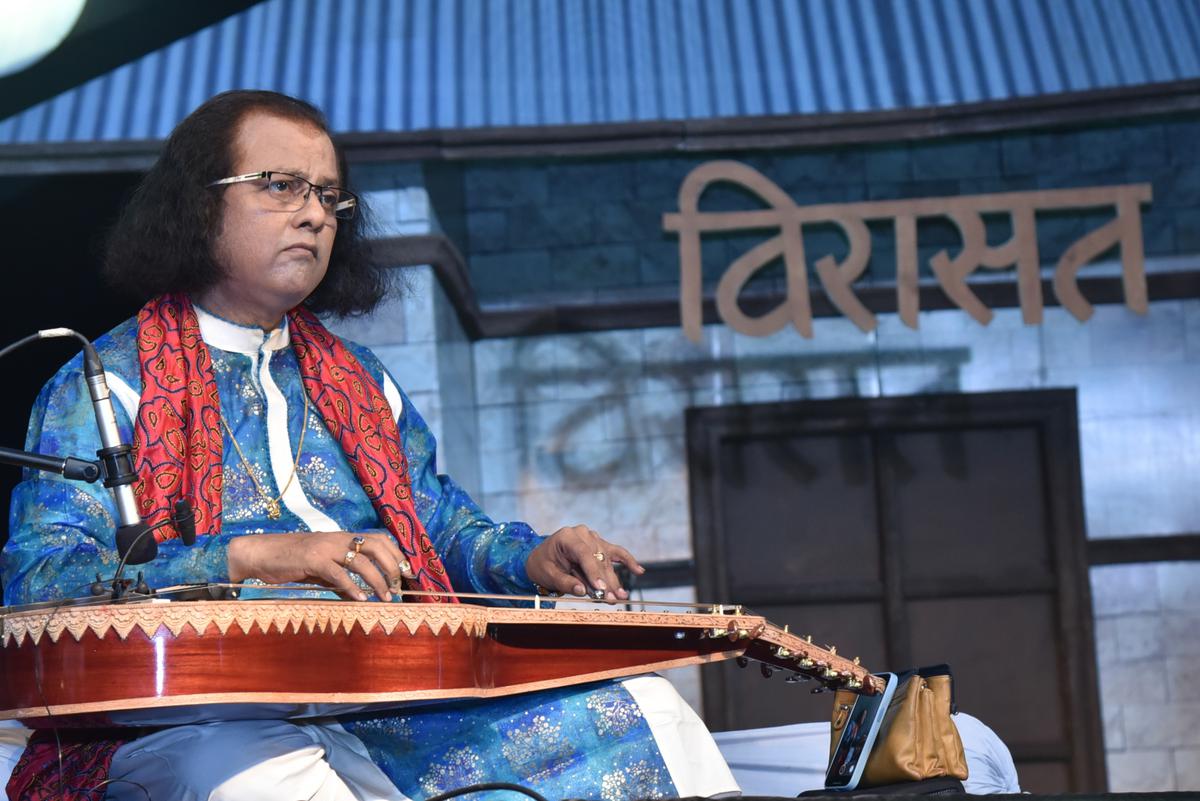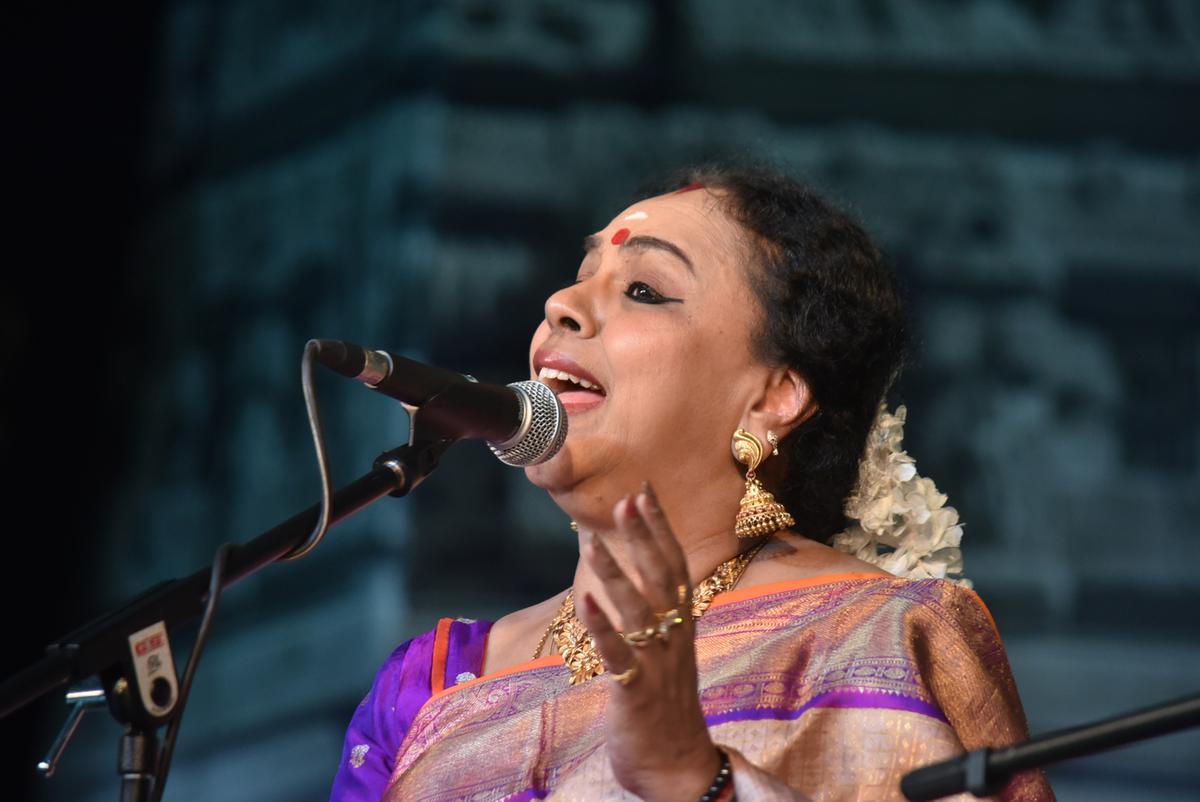The bright lights and festive air are heady, and it is a pleasure to wander through stalls featuring interesting handicrafts and cuisines from across India. And, starting from 6 p.m. to midnight, you are serenaded by performances at the 15-day Virasat Festival, by Reach, in Dehradun.
This landmark event in North India’s calendar of significant cultural events was conceived 27 years ago by like-minded friends, passionate in their desire to promote the arts. It has platformed virtually every great artiste in the world of music, from Sabri Quwwals and Shafqat Amanat Ali from Pakistan to our own Pt. Hari Prasad Chaurasia and Pt. Shiv Kumar Sharma.
Today, the festival struggles to survive due to erratic funding. Harish Awal, one of the founders, says, “It’s a constant struggle to stay afloat”.
Kumud Diwan
The 15-day event has the longest duration of an arts festival in India, and features Indian folk, pop and classical music and dance as well as modern dance troupes from Russia and South Africa.
“To bring in a younger, more diverse audience, the organisers set the cultural performances in the midst of a vibrant mela”, says R.K. Singh, the main organiser.
The classical cultural performances some nights end with a popular performance — be it the Wadalis, Radhika Chopra the Nizami qawwals, or Ricky Kej (November 10). Pt. Debashish Bhattacharya of the Maihar gharana is an internationally-recognised artiste and a two-time Grammy nominee. His version of the slide guitar, termed the chaturanga (or four-hued) is a complete instrument, enabling all instrumental techniques, including bolkaari, gamak, meend and jhala.
Rich tapestry
Starting with the early evening raag Shuddha Kalyan, Debashish wove a rich tapestry of sound in a thoroughly satisfying aalap jor jhala. His emphases on the ‘ni’ and ‘ma’ notes were masterly. The judicious use of the notes brought out the perfect picture of the raag. Next, Debashish played raag Jaijaiwanti, which showcased his knowledge of the raag and matched his mastery of his instrument — he extracted varied hues with beauty and ease.
Jaijaiwanti can be played by those who know it well in different ways – while some focus on the Des ‘ang’, and some on the Kanhra ‘ang’. Debashish chose to the present the more lyrical Des ‘ang’.

Pt. Debashish Bhattacharya
Both the maseetkhani compositions that Debashish played were in teentaal. He was accompanied on the tabla by Shubh Maharaj, grandson of the iconic Pt. Kishen Maharaj of the Banaras gharana. Shubh Maharaj is a confident, highly accomplished player, who enhances every concert he plays.
Rare thumris
The next concert was by Kumud Diwan, who presented rare thumris with adaa (flair). Her pauses, and focus on the evocative lyrics revealed her ‘taalim’. Though from Bihar, she has learnt both the Gaya and Banaras styles of thumri. Explaining how Muzaffarpur in Bihar was a centre of thumris in older days, with greats such as Panna Bai making it their home, Kumud Diwan started her concert with a Bihari thumri set to Keherwa taal, in raag Mishra Bhinna Shadja.
The evocative lyrics, sung with great deliberation, were about a male lover berating his mate — When I forbade you, why did you add a dot (boonda) to embellish your bindi!
The thumri cannot be savoured in full without proper accompaniment. Paromita Mukherjee, lent able support on the Harmonium, as was Shubh Maharaj on the tabla. The second composition was a rare dadra in Mishra Pilu. Kumud Diwan explained what a ‘seeri ka dadra’ was — the notes ascend and descend like the steps of a stair (seedi). The concluding thumri was an unusual vilambit Bhairavi.
Power-packed performance
The evening concluded with a power-packed concert by Jasbir Jassi, who combined his usual repertoire of pop with the Sufi prose of Baba Bulleh Shah and Amir Khusrau, amongst others, and folk songs, including those from Himachal. He had the crowd on its feet for over two hours, though one wished he had more interspersions of slower pieces as his soulful music is equally appealing.
The next evening started with another energetic jugalbandi between Pt. Ronu Majumdar (flute) and U. Rajesh (mandolin). They were accompanied on the tabla by Pt. Mithilesh Jha and on the mridangam by Skanda Subramaniam. Jugalbandis between Carnatic and Hindustani musicians have to be confined to a handful of raags that are common or similar in structure to both the systems — this time the duo chose raga Mohanam/Bhupali. Softly lyrical, the mood of the raag was explored expertly by both. The main raga was Abheri/Bhimpalas in which the aalap and jor moved to the composition, without jhala.
As both the instruments, flute and mandolin, do not really lend themselves to ‘jhala’, this was sensible. Here the playing became more robust and lively, frequently ending in prolonged repetitive musical phrases, concluding in ‘ati drut’ speed. One admired that both artistes focussed on the speciality of their instrument without emulating the other — Ronu’s presentation with perfect breath control was as enjoyable as Rajesh’s sliding movements of gamakas and meends. Slowly loosening his string to the desired note, and then tightening to reach another note to produce a different kind of ‘meend’ was interesting too. Ronu playing on different flutes to show the notes in three octaves added to the appeal of his presentation.

Sudha Ragunathan
Steeped in bhakti
The next concert was by senior vocalist Sudha Ragunathan. It was one of her finest concerts that this writer has heard, despite an allergic reaction to a strong perfume in the air. The doyenne was truly in her element. Explaining the devotional tone in the lyrics of the popular varnam ‘Maate malayadwaja’ in Khamas enhanced the appeal. ‘Mahaganapatim’, the next piece in raga Nattai was brief but enjoyable. The main piece was in raga Kasi Ramapriya — ‘Visalakshim vishveshim’, a kriti by Muthuswami Dikshitar.
Sudha traversed between notes, rendering the most intricate patterns with mastery and a racy pace, leaving the audience in awe. The next lilting, folksy composition was in Telugu by Tallapaakka Annamacharya tuned by Nedunuri Krishnamurthy, extolling Venkateshwara.
Sudha concluded her concert, as per tradition, with a brief but highly memorable thillana, by the veteran Balamuralikrishna, in raga Brindavana Saranga. She was accompanied on the mridangam by Skanda Subramaniam and violin by Delhi R. Sridhar.
The evening concluded with a modern dance performance by artistes from Russia. But, it failed to hold one’s interest, despite the novelty of the presentation.